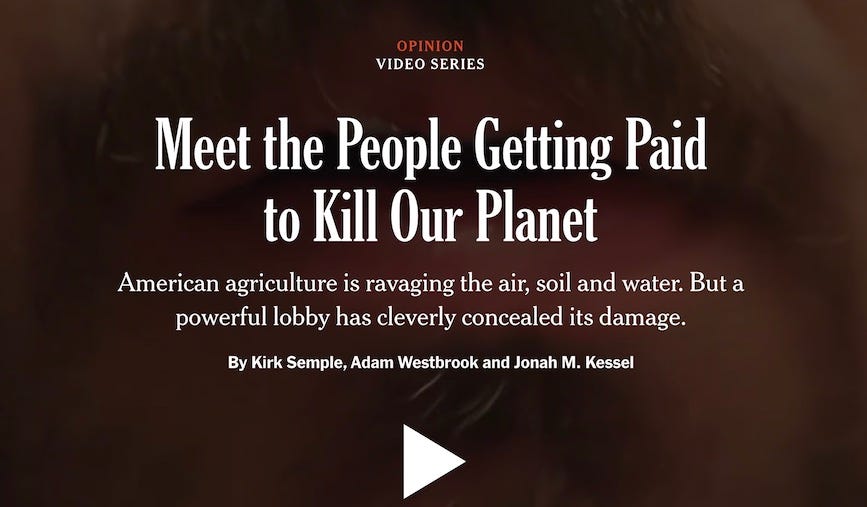I have no problem telling people to eat less beef for the planet but when it comes to talking about the morality of eating meat, I find myself shying away. Lately I’ve been wondering why, so I asked Jamie Woodhouse, host of the Sentientism Podcast, YouTube and related online communities, to help me unpack the reasons behind my trepidation in this my first podcast episode for the FutureFeed newsletter.
A very brief snippet of the conversation follows below but you should really listen to the whole conversation by clicking the link up top. Let us know what you think — you can find Jamie and me on Twitter, or join one of Jamie’s Sentientism communities (links at the end of this issue). Oh, and if you’re enjoying this newsletter, consider sharing it by clicking this button:
Jenny: To start, can you explain a little bit about what Sentientism is?
Jamie: Sentientism is a way of thinking about the world. In a sentence, I'd summarize it as evidence, reason, and compassion for all sentient beings. The shorthand for "sentient" is any being that has the capacity to experience things, primarily suffering or flourishing.
Jenny: What I wanted to talk to you about today is my own reluctance. I have noticed in myself that I am more comfortable telling people to eat less meat for the climate rather than talking about animals as sentient creatures. Why do you think it’s such a difficult conversation?
Jamie: I think it almost feels slightly embarrassing to have an ethical stance about anything in a way. There’s a sense that you’re about to preach or get on your high horse. And food is just so deeply embedded in the fabric of our lives. People are so implicitly confident that what they’re doing must be fine, because that’s what they’ve always done and they do it every day, three times a day.
It’s also difficult when you’ve gone through this at a different pace from the people around you — whether it’s family, friends, society at large — if you’re the outlier, that makes it difficult. Because they knew you before you changed, right? You’re the one who’s changed. You’re different.
Jenny: In the food advocacy world, it feels like most people don’t choose veganism as a response to factory farming but small farms where meat is “humanely slaughtered.”
Jamie: That’s a path that has been well trodden, and there’s billions of beautifully crafted “Happy Cow” marketing that encourage us to consider that path. Because it's nice and reassuring: we can still have what we want but we can feel a bit better about it and ourselves. But when you think about the word “humane,” you don't think of someone who’s been electrocuted, or gassed, or smacked with blunt force trauma.
Jenny: I guess at the heart of it is, what do we consider these animals and insects? Are they equal to us? What are they thinking and feeling? There’s only so much you can know, whereas I know the pollution caused by, say, chicken farming and processing. It’s gross and horrible work, which leads me to go, ok, who cares what’s going on in their chicken heads?
Jamie: I'm not sure we’ll ever get a perfect answer, but I think one of the things that really does help even in the case of chickens or birds, or vertebrates, and fish to some extent, is, an extension of a human concept of contact theory. Whether it’s spending time at an animal sanctuary or having a companion animal, when you spend enough quality time, and the same is true with fish — Jonathan Balcombe’s work is absolutely amazing — you get a richer, intuitive sense of what their lives might be like.
I'm not going to tell you that I think a chicken has a sense of existential angst but I’m absolutely sure they don't like physical pain. And I'm absolutely sure they do feel some sort of compassion and affinity for their family group.
There is also some danger when we follow the path of judging others based solely on how “just like us” they are. That’s clearly a problem in human ethics too. The reason that a chicken or a fish has moral value, in my view, is not to the degree that they are like a human. It’s because of their own perspective, and the richness and salience of that perspective.
What’s amazing is most animal farmers do feel some sense of connection to some degree with their animals. They’re not just dollar signs, to the point where most of them outsource the slaughter. Now, that’s partly an economic thing but I think it’s also because they don’t want to see them killed.
Jenny: Oh yeah, I have talked to so many livestock farmers who absolutely love their animals.
Jamie: A critical part of this idea of Sentientism is if we’re going to really have a universal compassion for everyone, both non-human animals and for humans, we have to include the humans we disagree with and the humans who would be impacted by the conclusions of our ethical deliberation. We need to think about all sorts of different diverse communities and families and the people impacted, including farmers and the people who get taste pleasure or cultural pleasure from participating in eating meat. We are, in a sense, proposing to do some — I would argue minimal — but some form of harm to them. And that leads to a phrase I quite like, which is this idea of a “just transition” where we ask how can we transition in a way that is compassionate for all the people and sentient beings involved?
Jenny: And no one is perfect. We all have our own unique experiences that have shaped us. I've changed my mind about things. I've been wrong about things. I just want us all to interrogate our own stories and points of view a bit more.
Jamie: I completely agree. There’s a caricature of veganism that we’re pretending we’ve achieved some state of moral and ethical purity. That’s just bullshit. There’s no agricultural system that doesn’t cause some sort of harm. So it’s not like, we’re in the perfect camp and everyone else is evil. It’s all about nuance. There’s no perfection to attain. But that shouldn't get in the way of us just trying to do a bit better.
About Jamie: Jamie is working to develop Sentientism as a philosophy and as a global movement. He hosts the Sentientism Podcast and YouTube and has published articles and presented academic seminars on the topic. He is building a range of global Sentientism Communities (open to all) that so far span over 100 countries. You can find him on Twitter @JamieWoodhouse and @Sentientism. Jamie is also a consultant.
Mentioned in this episode: Jonathan Balcombe writes about the inner life of animals and fish; Some animals are more equal than others, Garrett Broad, If the world adopted a plant-based diet we would reduce global agricultural land use from 4 to 1 billion hectares - Our World in Data. Researchers Dr. Corey Lee Wrenn and Dr. Kim Socha.
Also: What a meatless future could mean for farmers (my reporting in Vox) and Research-Based Tips on Optimism .
Hits and Misses: What I cooked for my non-vegan family
Hits: Undoubtedly this vegan pea and leek pasta, which even my pickiest picky kid liked! I basically just veganized this recipe by adding some coconut cream in place of dairy cream and skipping the pecorino. I also made a really good potato hash the other night, using what was hanging around my vegetable bin: potatoes, spinach leaves, onions and garlic, and then cooked up Trader Joe’s soy chorizo (so flavorful!) and Just egg and mixed it all together. Topped with some Violife cheddar shreds. PS I love the taste of Violife but they don’t melt as well as I’d like. What’s a vegan cheese brand that melts up really well?
Misses: Thai-style corn fritters. I veganized this Food52 recipe and really liked the corn meal taste but the rest of my family found it too greasy. Womp womp.
What I’m reading: Lots of tweets about this NYT op-ed video. My take is, yes, the voiceover and teeth gnashing are kind of cringy, Jayson Lusk is an economist and shouldn’t have been included in a list of lobbyists, but the research in this piece is solid. Read more Jennifer Jacquet.
Hey, new readers! If you like what I’m working on, you can help by sharing it:







